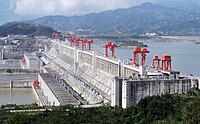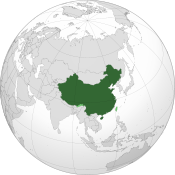Massive flooding in China; over 550 thousand evacuated
Saturday, June 18, 2011

Image: File Upload Bot (Magnus Manske)..
Heavy June rainfall has forced China to evacuate more than 550,000 people from their homes. Massive floods have devastated the central and southern parts of the country, causing rivers to overflow their banks and triggering mudslides. The rains follow the worst drought in China in over 50 years, which has decimated crop yields.
| Since June 13, the damage caused by the rainstorms has led to ... the emergency evacuation of 671,200 people to safety. | ||
—China's Ministry of Civil Affairs | ||
Overall, 40 rivers have risen above safe limits, stressing dykes and dams including those on China's largest waterway, the Yangtze River, which is flooding downstream while experiencing a severe drought near its source in the north.
China's disaster level has been raised to four, the highest on the scale. In a statement on its website on Friday, China's Ministry of Civil Affairs said, "Since June 13, the damage caused by the rainstorms has led to ... the emergency evacuation of 671,200 people to safety."
The current round of heavy rains began in early June. Since then, more than a million and a half people have been displaced in the central and southern regions of the country and at least 168 deaths have been reported. Meteorologists in Beijing are predicting more heavy rain in Sichuan, Guizhou, and Zhejiang this weekend.
The government has mobilized its forces to aid in the massive evacuations. According to Reuters, local authorities are distributing a box of instant noodles and a carton of bottled water to those affected by the flood. But villagers have reported that survival is difficult, especially for those still trapped by the flood waters in small villages, and distribution of aid is slow, with some not receiving any.
A villager was quoted by Reuters: "To be frank, those rescue boats cannot go through those narrow lanes inside the village. A lot of them depend on their relatives rowing small wooden boats to get to them... It is hard to help these people inside there." Another villager, Shou Pengfei said, "Some did not even get any relief items. There is no electricity and you get bitten by mosquitoes all the time."
| Some did not even get any relief items. There is no electricity and you get bitten by mosquitoes all the time. | ||
—Shou Pengfei, A Chinese villager | ||
According to the Beijing Climate Centre, weather trends have shifted drastically. Currently the rain is coming in shorter but fiercer bursts, with protracted periods of drought in between the torrential rain.

Image: Rehman.
The heavy rainfall is not likely to reduce the crop failure caused by months of drought, especially in the north, the heart of China's grain-growing bread basket, where many rivers have dried up. According to reports, the northern countryside has been left devastated by the droughts. Huge dams hundreds of meters wide are now small, muddy pools. Large cities such as Beijing are draining the underground water sources and China is facing a long-term water crisis.
Meanwhile, China is engaged in a huge multi-year engineering project designed to move water to the parched north and away from the flooded south. The North-South water project is a massive series of canals and pipes designed to carry water from the Yangtze and Yellow rivers to Beijing.
It is likely, analysts predict, that Chinese crop shortages will increase food prices worldwide. Even before the latest flooding, the severe drought in the north caused a shortfall in China's crop yields that will likely affect the price of wheat and may propel a price increase in global markets.
Related news
- "Poverty rises as food prices increase" — Wikinews, April 17, 2011
- "Typhoon kills two in southern China" — Wikinews, July 23, 2010
- "China: Heavy flooding displaces over a million, kills dozens" — Wikinews, June 14, 2010
- "Death toll from China rainstorm reaches 65" — Wikinews, May 8, 2010
- "22 killed as heavy rain hits Panzhihua, China" — Wikinews, July 28, 2009
- "Scores dead, thousands flee as flooding spreads across southern China" — Wikinews, June 15, 2008
Sources
- "China raises flood alert to top level, 555,000 evacuated" — Reuters, June 17, 2011
- "Fatal floods hit China forcing over 500,000 to flee" — BBC News, June 17, 2011
- "Floods Wreak Havoc" — Radio Free Asia, June 17, 2011
- Jonathan Watts. "China evacuates 500,000 as flooding breaks worst drought in 50 years" — The Guardian, June 17, 2011
- Damian Grammaticas. "China drought worsens in parched north" — BBC News Online, March 1, 2011
External links

